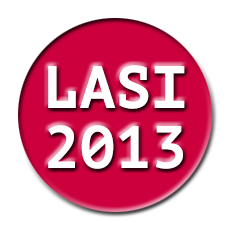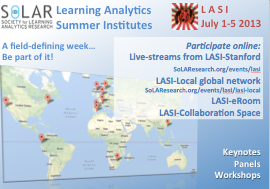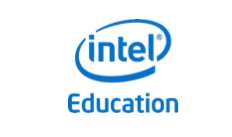
LASI 2013 (Palo Alto, CA)

 Learning Analytics Summer Institutes, 2013
Learning Analytics Summer Institutes, 2013
Stanford University
and around the world f-f & online, July 1-5, 2013
twitter: #lasi13
Program
- 1. LASI Program Monday
- 2. LASI Program Tuesday
- 3. LASI Program Wednesday
- 4. LASI Program Thursday
- 5. LASI Program Friday
- LASI 2013 Logistics
Participate
- Please participate in the LASI Next Steps Discussion here
- How was it for you? Blog your reflections on LASI and contribute to the LASI-Blog Aggregator
- Add your photos to the global picture: upload to Flickr, tag them lasi13, ensure they’re set as public to show in public searches, and we’d encourage a CC license. They’ll also display in the LASI-Blog Aggregator
- Join others during the webcasts and ask questions to Stanford speakers. Come to the LASI-eRoom
- Find (and deposit) presentations and Workshop session materials here (Google Doc).
- Add your big questions about learning analytics here: Big questions.
- As you hear new terms at LASI 2013, add them to the “word wall” here. If you see a term you know on the wall, help the community define it.
- Get access to the workshop and plenary slides beforehand: Slides.
Sponsors
Venue and Logistics Information
Detailed Logistics Information
LASI2013 location
Center for Educational Research at Stanford (CERAS)
Rm 101 (CERAS Learning Hall)
520 Galvez Mall
Stanford
CA 94305
Campus accommodation
Munger Graduate Residences
Buildings 4 & 5
555 Salvatierra Walk
Stanford
CA 94305
Dining Hall location
Arrillaga Family Dining Hall
489 Arguello Way
Stanford
CA 94305
Introduction
Learning Analytics as both a research topic and emerging marketplace has recently garnered the attention of faculty, educational researchers and administrators, policy makers, data scientists and learning technology entrepreneurs. Unprecedented quantity of, and access to, learner-generated data has opened up new opportunities, for instance, for researchers to better understand how learners learn, for educators to assess the impact of teaching activities and interventions, and for learners to receive personalized, real-time, automated support for their learning advancements.
Learning Analytics (LA) as a field is related to disciplines such as educational data mining, machine learning, various branches of psychology, learning sciences, psychometrics, and systems theory. LA aspires to integrate cognitive, social, pedagogical, technical, and organizational components to advance a holistic view of learners and the cognitive, social, organizational contributions to their learning processes. Cross-disciplinary research, publications, and specific documented socio-technical systems and their associated designs and algorithms are important for advancing these goals.
For the past three years, the Society for Learning Analytics Research has hosted open online courses, the international LAK conference and national meetups, initiated a distributed research lab for PhD students, and established the Journal of Learning Analytics. During this timeframe, researchers from learning sciences, computer supported collaborative learning, and related disciplines have found research affinity with the emerging LA field.
Leading international universities have initiated programs and enacted strategies to use LA to improve learner success and improve organizational effeciency. Numerous schools have adopted personalization and adaptive learning systems to support learners. Corporations and startups have also turned their focus to learning analytics, resulting in numerous entrants into the LA field to promote increased learner success and more efficient learning practices.
This bricolage of research, intersecting fields of study, and corporate activity has created an exciting, albeit sometimes confusing, landscape for academics, PhD students, and the diverse users of LA products and projects.
Summer Institutes
A critical window of opportunity is opening as we stand on the threshold of what may be a new discipline with disruptive potential for educational research and practice. Bringing the right mix of people together for an intensive ‘summer camp’ could serve as an intellectual and social springboard to accelerate the maturation of the discipline — as was the case for other young disciplines, such as cognitive neuroscience.
The Learning Analytics Summer Institute at Stanford (LASI-Stanford) is a strategic five-day event, July 1-5, 2013, co-organized by SoLAR and Stanford University. The International Educational Data Mining Society is also assisting with event organization. In parallel, a global network of LASI-Locals will run their own institutes.
The objective is that participants will leave better equipped to actively engage in advancing the LA field through their teaching and research activities. Specifically, LASI has two goals:
- Build the field of Learning Analytics through cross disciplinary interactions, identification of research and teaching needs, advancement of LA methods, and connecting isolated researchers.
- Develop the skills and knowledge of doctoral students and academics, equipping them to engage actively in LA research and teaching.
Selection of participants will balance disciplines, skillsets and seniority — see the application criteria for details.
Format
The Summer Institute’s goals of (1) building the LA field and (2) developing the skills of researchers, educators and students will be achieved through a combination of lectures, hands-on tutorials, group work and ample opportunity for informal interactions. Activities include presentations from leading researchers, innovative startups, and experts from related fields, coupled with panels and workshops… all designed to define the needs of the LA field, identify research gaps and needs, forge the community and establish a research agenda.
Institute Leads
Ryan S.J.d. Baker, Columbia University, Teachers College, USA
John Behrens, Pearson Education, USA
Simon Buckingham Shum, The Open University, UK
Shane Dawson, University of South Australia, AUS
Dragan Gasevic, Athabasca University, CA
Caroline Haythornthwaite, University of British Columbia, CA
Ken Koedinger, Carnegie Mellon University, USA
Grace Lynch, University of New England, AUS
Taylor Martin, Utah State University, USA
Roy Pea, Stanford University, USA
George Siemens, Athabasca University, CA
Stephanie Teasley, University of Michigan, USA
Enquiries
Enquiries about participating in, or sponsoring, LASI may be emailed to George Siemens <gsiemens atsign gmail.com> with the subject line containing: LASI Enquiry
If you are interested in connecting with the others running a regional/local event, please contact Simon Buckingham Shum <s.buckingham.shum atsign gmail.com> with the subject line containing: LASI Local
Speakers at Stanford are by invitation, with the program now being designed. Queries around the program should go to Dragan Gasevic <dragan.gasevic atsign gmail.com> with the subject line containing: LASI Program. Regional/local satellite events will design their own schedules and programs.
How to participate
LASI-Stanford was massively over-subscribed and applications are now closed. This is testament to the timeliness of the field and the LASI concept, and we are sorry we had to turn away so many high calibre people.
However, you are encouraged to participate by tuning in online to the live-streamed morning sessions from Stanford, or organising or attending a LASI-Local, each of which is being designed to meet national/regional agendas.









